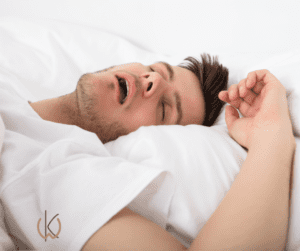
Sleeping with your mouth open is often linked to snoring, but does mouth breathing cause dental problems too? If you’re guilty of this unconscious habit, you may be affecting your oral health.
What causes mouth breathing at night?
While most people breathe in and out through their noses, there are those who are known as mouth breathers. These people breathe through their mouths almost exclusively and could benefit from some re-training on how to breathe more easily through their nose.
Mouth breathing can also be a temporary solution to a stuffy nose due to a cold or allergies. This can cause occasional mouth breathing which is not a cause for concern.
Then there are those who have a medical condition, such as sleep apnea, where they mainly breathe through their mouths at night. This condition causes people to stop breathing several times during the night, and when their oxygen levels drop, they gasp for air. Experiencing these frequent apnea episodes encourages a mouth-breathing habit.
Chronic mouth breathing can indicate that a person needs additional medical intervention.
Does mouth breathing cause dental problems?
Does mouth breathing cause dental problems? According to a study conducted by BioMed Research International (BRI), it can. In the study, researchers observed a group of people who breathed through their mouths and a group who breathed through their noses. They discovered that mouth breathers accumulated more plaque on their teeth. They were also more likely to have large colonies of bacteria that are associated with tooth decay.
Other dental problems caused by mouth breathing include:
- Bad breath
- Poor positioning of the jaw leading to teeth grinding, jaw pain, and an irregular bite
- Greater risk for gum disease
- Hoarseness and swallowing difficulties
- Enlarged tonsils and adenoids
- Higher incidence of snoring and sleep apnea
Those who engage in mouth breathing are more likely to have one of these unpleasant symptoms.
Can a dentist help with mouth breathing?
Treatments for mouth breathing will vary depending on the underlying causes. Talking with your doctor or dentist can help you identify the source and appropriate treatment options.
Getting regular dental cleanings may help control some of the problems caused by mouth breathing. Scheduling a professional cleaning at least once every six months may keep plaque accumulation under control and help fight chronic bad breath. In between dental visits, remember to brush and floss daily.
In treating sleep apnea, West Seneca dentist Warren M. Krutchick, DDS believes that behavioral changes can offer snoring relief and reduce sleep apnea symptoms. He offers some of the best tips for sleep apnea treatment and snoring prevention.
Sleep apnea appliances are another way to help those with this condition breathe better. Worn while you sleep, these appliances hold your mouth and jaw in such a way that makes breathing easier and will stop snoring.
Mouth breathing can put you at risk of tooth decay and other dental problems. If you think you may sleep with your mouth open or have sleep apnea, talk to your doctor or dentist.
